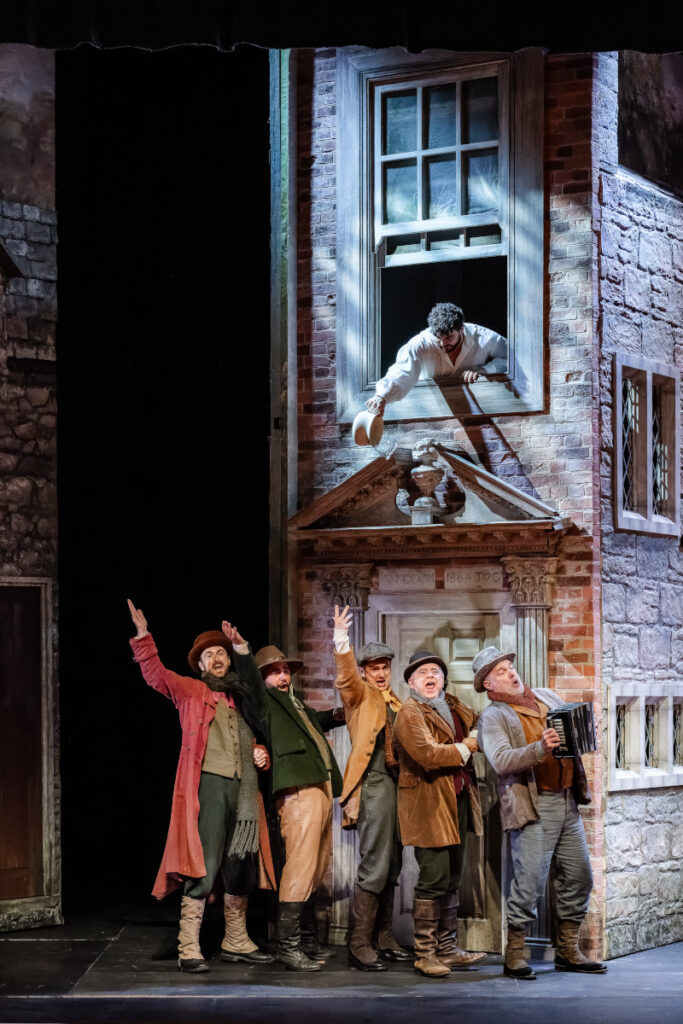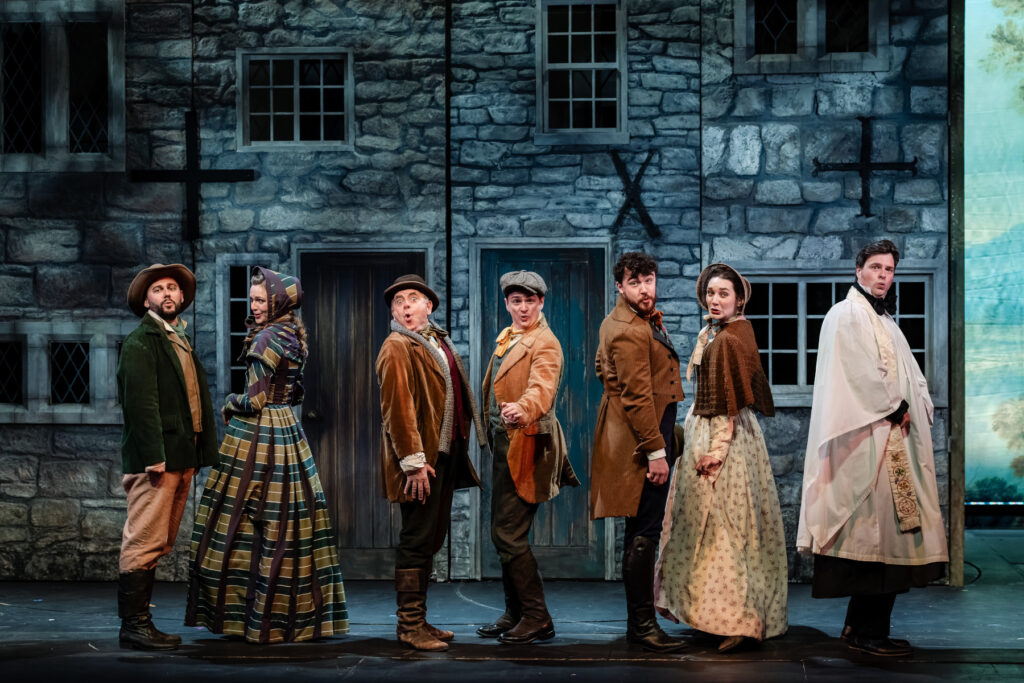How we respond to Paul Carr’s operatic makeover of Thomas Hardy’s Under the Greenwood Tree will depend on how much we consider the author’s 1872 publication to be an examination of a changing rural community or a boy-meets-girl romance. The book’s alternative title, The Mellstock Quire, points to a study of cultural heritage yet, despite the loss of a once-prized village institution, the novel is one of Hardy’s most positive and optimistic works – unique in his output. In Claire Seymour’s introduction to the 2004 Wordsworth Classics edition, she underlines the author’s sly, Chaucerian humour in respect of the rustics and the more educated parishioners, both drawn by Hardy with affection and wistfulness. It’s something that might prompt an unashamedly sentimental portrayal in musical terms. So, it was fascinating to discover the composer’s refreshing view of the work as a romantic comedy – an interpretation not disowning social commentary but giving plenty of room for gentle humour achieved through well-defined characterisations. My own sepia-tinged musings on Hardy were upended by Carr’s startling primary colours.

Whilst following the trajectory of the novel, librettist Euan Tait makes clear his text is “After” Thomas Hardy, and he and Carr make no bones about fashioning a filleted version of the author’s Wessex tale. They remove certain characters wholesale (Geoffrey Day and the witch Mrs Endorfield) and enlarge others (Ellie Gifford and the Mellstock villagers), all handsomely attired in Stewart J Charlesworth’s period costumes. While these modifications are inconsequential, their decision to make Dick Dewy aware of the Reverend Maybold’s proposal to school-teacher Fancy Day diminishes inherent tensions and nullifies the sting of Hardy’s final words relating to “a secret she would never tell”. However, it was a well-judged idea to add an imagined Christmas Day sermon with its fateful implications for the Mellstock choir when the vicar announces, “a new harmonium for the birth of the new-born King”.
Departures from Hardy’s original aside, this “opera in four seasons” privileges charm and entertainment over nostalgia and sober reflection. It’s not without its emotional dramas, although these are not always mirrored in Carr’s busy and eclectic score, although that’s not to gainsay its engaging tunefulness, colourful orchestration and stylistic traversal bridging Rachmaninoff to Rutter and beyond. The art of an uplifting melody is clearly in safe hands, but when the choir meets the vicar to discuss its disbandment, the music feels unnaturally cheerful. Similarly, the unease felt by Fancy after Mr Shiner’s surprise proposal prompts a rousing duet with an oom-pah bass.

More convincing is the assimilation of well-known melodies, such as the familiar carol ‘Joy to the World’ and hints of ‘Abide with me’. Both were lustily sung by a substantial chorus jammed in front of Rufus Martin’s chocolate box sets. Carr is generous in his allocation of solo and ensemble numbers. Most memorable amongst these were Fancy’s heartfelt monologue to Dewy (including a beguiling violin solo) and then a splendid trio for her three suitors (all baritones) as they reflect on their marital chances. This last brought much fireside warmth and, in its economy of means, a welcome change from earlier roistering.
Amongst the soloists there were some striking portrayals with bass Ossian Huskinson making the most of Shiner as an over-confident gentleman farmer-cum-churchwarden and bass-baritone Thomas Humphreys as the detached and insensitive Reverend Maybold – both highly credible. High baritone Felix Kemp was a perfect fit for Dick Dewy who allied glorious tone to an easy blend of resolution and self-effacement. A charismatic Jamie Groote, as his beloved Fancy Day, combined a natural stage presence with a voice that soared over the orchestra.
Elsewhere, Frances Gregory made for a comely and sweet-voiced Ellie Gifford, while members of the Mellstock choir delivered their subordinate roles with finely tuned characterisations, narrowly avoiding parody, but amusingly individualised: Matthew Bawden a stuttering Thomas Leaf, Tim Bagley an excitable Robert Penny, Aled Hall a salacious Elias Spinks and Eddie Wade a paternal Reuben Dewy.
Below stage, Jeremy Carnall conducted the 40 or so members of the Festival Orchestra with his customary efficiency, underlining the score’s brio and dance-like qualities, if not always taming the score’s crowded textures. Overall, Under the Greenwood Tree is a significant achievement for both the composer and Dorset Opera who, in celebrating its 50th anniversary, had commissioned the work. Judging from the enthusiastic response around me, this operatic debut will in time reach new audiences keen for an accessible stage work lasting just under two hours.
David Truslove
Under the Greenwood Tree (world premiere 23July 2024)
Music: Paul Carr
Libretto: Euan Tait – After Thomas Hardy
Cast and production staff:
Fancy Day – Jamie Groote; Dick Dewy – Felix Kemp; Reverend Maybold – Thomas Humphries; Mr Shiner – Ossian Huskinson; Ellie Gifford – Frances Gregory; Reuben Dewy – Eddie Wade; Thomas Leaf – Matthew Bawden; Alias Spinks – Aled Hall; Robert Penny – Tim Bagley
Director – Paul Carr; Set Designer – Rufus Martin; Scenic Artist – Binny Mathews; Costumes – Stewart J Charlesworth; Lighting – James Smith; Dorset Opera Chorus; Dorset Opera Festival Orchestra; Conductor – Jeremy Carnall
Coade Theatre, Bryanston School, Dorset, 25 July 2024.
Top image: The storm scene in Under the Greenwood Tree.
All photos © Julian Guidera.